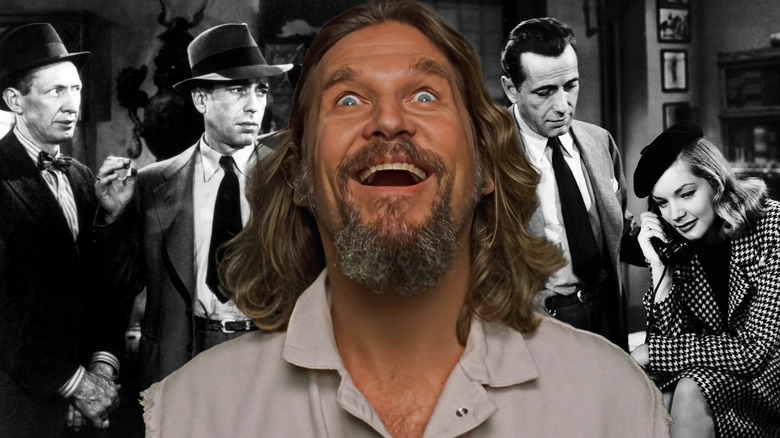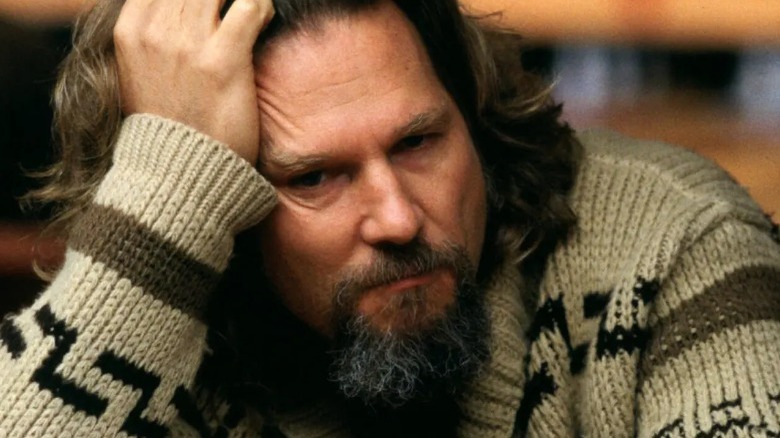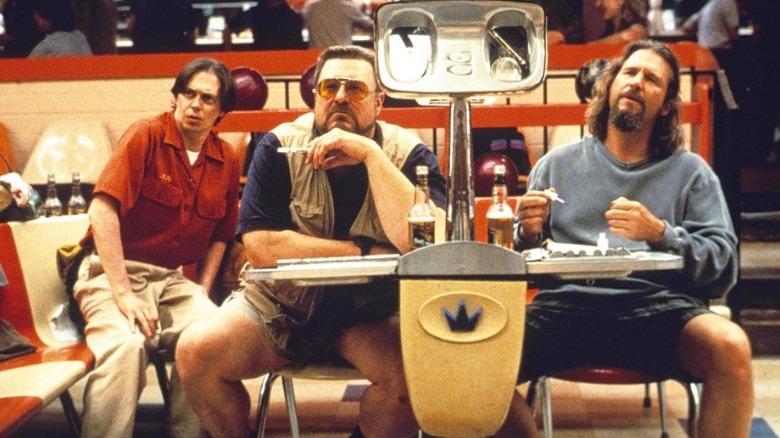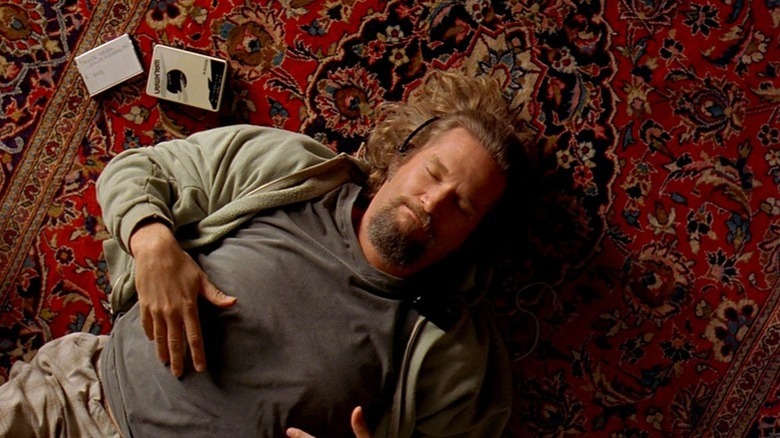The Film Noir Classic That Inspired The Coen Brothers To Make The Big Lebowski
The Coen Brothers injected their 1998 cult crime-comedy, "The Big Lebowski," with a medley of thematic and aesthetic inspirations, ranging from hard-boiled crime noir to deliberately eccentric dream sequences. Although the basic plot points of the film follow the beats of a convoluted kidnapping mystery that meanders in several directions, "The Big Lebowski" is more of a vibe, an amalgamation of idiosyncrasies that work due to a loose, free-flowing narrative structure. On many occasions, the Coen Brothers have credited the works of Raymond Chandler for inspiring parts of "The Big Lebowski," especially Chandler's 1939 hardboiled crime novel, "The Big Sleep," which seems to share slight similarities with the film. In the event of the 25th anniversary of "The Big Lebowski," let us look past the superficial threads that tie the L.A. noir classic and the comedic crime mystery by looking at the overlapping sensibilities these films share, despite being very different in tone, structure, and aesthetics.
It is not difficult to parse how "The Big Lebowski" is markedly different than "The Big Sleep" — the film's world mostly follows a chill, laid-back logic embodied by its central stoner figure, The Dude (Jeff Bridges) and delightfully indulgent in-jokes about other Coen Brothers films pepper the story, including references to "Barton Fink," "Miller's Crossing," and "Fargo." Every character is larger-than-life in ways that allow each actor to let loose in hilarious ways, a case in point being John Turturro's Jesus Quintana, who licks a bowling ball suggestively before flamboyantly whizzing them toward the pins. Even the presence of the German nihilist trio looks straight out of a fever dream, who use a "marmot" to intimidate Dude with exaggerated swag and accents. There's no way something as deliberately crafted as "The Big Sleep" could be similar to such an eccentric mystery-adventure. Am I wrong?
Convoluted mysteries
While Chandler's novel might've loosely inspired the Coens, Howard Hawks' 1946 film adaptation, "The Big Sleep," definitely shares a core with "The Big Lebowski." The opening narration hints that a tale of epic proportions is about to be unraveled; while the story is definitely epic, it is more about how the Dude deals with baffling situations as opposed to a detective-noir focused on its central disappearance. After all, the impetus for the Dude visiting the "Big" Lebowski — a millionaire who just happens to have the same name — is that Treehorn's men pee on a rug that "really tied the room together," and not indignation due to mistaken identity. While the Dude gets involved in a messy scheme involving the alleged kidnapping of Lebowski's trophy wife, the events that occur become increasingly strange and hilarious, and these dynamic moods eclipse the plot.
Hawks' film, on the other hand, is a certified classic that follows wisecracking P.I. Philip Marlowe (Humphrey Bogart), who is summoned to Sternwood's mansion to resolve a gambling debt issue. Despite being more serious in tone, "The Big Sleep" hinges its appeal on cryptic reveals and general befuddlement, where the hullabaloo surrounding the mystery supersedes the need to resolve it. There are too many murderers and victims, a plethora of tertiary characters to account for, and electrifying sexual chemistry between the leads that often overshadows much else. Despite being entertaining, "The Big Sleep" can often be too confusing, to the point that it's just vibing: the mystery-noir becomes so obtuse, it allows us to put ourselves in Marlowe's shows to solve the puzzles for him.
Joel Coen echoed Chandler's sentiment of scenes assuming more importance than the plot while talking about "The Big Lebowski," stating that "The plot is kind of secondary to other things." Interestingly, the overlaps between the two films, do not stop here.
What's a shamus?
Steve Buscemi's Donny is hilariously out-of-loop when it comes to key events concerning bowling buddies Dude and Walter (John Goodman), with the recurring gag being Walter asking him to just "shut the f*** up." During one such instance, Donny asks "What's a shamus?" and later in the film, Dude finds himself being followed by a P.I. (a callback to the Coen's "Blood Simple"). Incidentally, Hawks' "The Big Sleep" is about a shamus who attempts to reach the heart of a labyrinthine mystery at the behest of a wheelchair-bound rich dude, whose daughter Vivian (Lauren Bacall) is echoed in Julianne Moore's avant-garde artist, Maude. While Carmen's gambling debts are the catalyst for Marlowe's journey, Lebowski's "missing" wife Bunny serves as the impetus for the shenanigans in which the Dude and Walter get involved.
While "The Big Sleep" poses a murky mystery rife with red herrings and blackmailing, "The Big Lebowski" takes a tongue-in-cheek approach to these elements. The mafia guy Carmen owes money to is swapped out for Treehorn, producer of the hit (?) porno "Logjamming" starring none other than nihilist leader Uli Kunkel and Bunny herself. The big blackmailing plotline in Hawks' film also has a porn subtext, although implied subtly as opposed to the satirical, overt route that the Coens take. Moreover, the events of both films take place in Los Angeles, which comes with its specific history of cinematic noir crimes that are impossibly incoherent to execute on a realistic level. While the dead bodies and double-crossings pile up as the mystery intensifies in "The Big Sleep," Dude has to contend with a botched hand-off, the weight of Bunny's life being "in his hands," and a random severed toenail that might or might not be Bunny's. A literal case of strikes and gutters, ups and downs.
Philip Marlowe vs. The Dude
Boggart's Marlowe is a tough-as-nails private eye, a kind of eternal bachelor who dives into his cases with determination. Marlowe's hard-drinking is more of a stylistic coping mechanism than an actual flaw (within the moral standards of a hardboiled crime thriller) and despite being shrewd, he seems a bit out of his depth while solving Carmen's problems in "The Big Sleep." While Marlowe can be a chill dude in his own way, nobody is cooler than The Dude — the man does not even flinch when he is dunked headfirst into a toilet by debt enforcers, as he casually fishes out his signature sunglasses out of the toilet and wears them. Perennially unbothered yet appropriately worried during tense situations, Dude just allows himself to be swept up in the convoluted Bunny mess, never letting go of his White Russian even when shoved inside a limo. What a dude.
Just like Marlowe's sizzling chemistry with Vivian allows the plot to branch into interesting directions, Maude's encounters with Dude sheds new light on the case at hand. Maude is the one to reveal Bunny's involvement with Kunkel and Treehorn, which eventually allows Dude to piece the truth together about Lebowski's true intentions. Although Dude is no P.I., he is forced to assume this role and navigate situations typical of this profession, including being tailed by shady cars, following leads (which he uncovers accidentally whilst being high), and dealing with a range of threats and increasingly ludicrous home invasions. Unlike Marlowe, Dude has Walter by his side, who alternates between Vietnam war-flashback fury and uncharacteristic self-restraint (which somehow ends in violence).
All things considered, The Dude seems like a much cooler dude to hang out with than Marlowe, but well, you know, that's just, like, my opinion, man.



